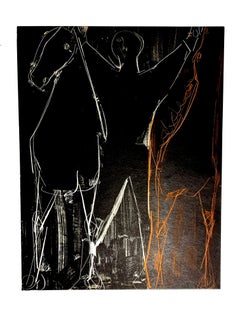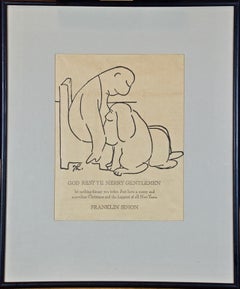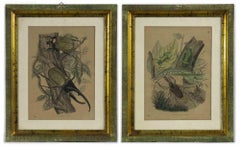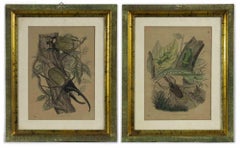Emil Hochdanz Animal Prints
to
1
Overall Width
to
Overall Height
to
2
194
161
118
94
1
1
1
1
1
1
1
Artist: Emil Hochdanz
Exotic Animals - Original Lithograph by Emil Hochdanz- 1866
By Emil Hochdanz
Located in Roma, IT
Exotic Animals is a color lithograph realized by the German atist E. Hochdanz in 1866.
Image dimensions: 19.9 x 15.3 cm.
Under the plate: Art Anst.v E....
Category
1860s Emil Hochdanz Animal Prints
Materials
Lithograph
Related Items
Marino Marini - Horses - Original Lithograph
By Marino Marini
Located in Collonge Bellerive, Geneve, CH
Marino Marini - Horses - Original Lithograph
1951
Dimensions: 32 x 24 cm
From the art review XXe siècle
Unsigned and unumbered as issued
Category
1950s Surrealist Emil Hochdanz Animal Prints
Materials
Lithograph
Christmas Lithograph Poster After James Thurber "God Rest Ye Merry Gentlemen"
Located in Alamo, CA
This is a rare Franklin Simon Department store Christmas lithographic poster with an image after a James Thurber cartoon drawing of a man in a chair with...
Category
Mid-20th Century Minimalist Emil Hochdanz Animal Prints
Materials
Lithograph
$460 Sale Price
20% Off
H 23.38 in W 19.38 in D 0.5 in
Pablo Picasso - Jeu de la Cape - Lithograph
By Pablo Picasso
Located in Collonge Bellerive, Geneve, CH
Lithograph by Picasso
Atelier Mourlot.
Paper: Vélin.
Dimensions : 9 5/8 x 12 7/16 inches
Reference: Bloch 1015
Picasso is not just a man and his work. Picasso is always a legend, ...
Category
1960s Modern Emil Hochdanz Animal Prints
Materials
Lithograph
“Europa and the Bull”
By Alvar Sunol Munoz-Ramos
Located in San Francisco, CA
You have to hand it to the bull. Not just taking Europa with his unassailable power (he is Zeus in disguise, after all) he brings along a retinue for his seduction of the beautiful P...
Category
1980s Modern Emil Hochdanz Animal Prints
Materials
Paper, Lithograph
Warner Brothers Orchestra Bugs Bunny Daffy Duck Porky Pig Cartoon Movie Legends
By Albert Al Hirschfeld
Located in New York, NY
Warner Brothers Orchestra Bugs Bunny Daffy Duck Porky Pig Cartoon Movie Legends
Al Hirschfeld (1903-2003)
Warner Brothers Orchestra
Etching and Aquatint
Sight 15 1/4 x 23 1/2 inches...
Category
1990s Performance Emil Hochdanz Animal Prints
Materials
Paper, Lithograph
Le Goût de Bonheur: one plate (Woman)
By (after) Pablo Picasso
Located in Collonge Bellerive, Geneve, CH
Artist: Pablo Picasso (after)
Medium: lithograph, Arches paper
Portfolio: Le Goût de Bonheur
Year: 1970
Edition: Total of 1998 copies (666 each in G...
Category
1960s Modern Emil Hochdanz Animal Prints
Materials
Lithograph
Max Ernst - Elektra - Lithograph
By Max Ernst
Located in Collonge Bellerive, Geneve, CH
Max Ernst - Elektra
Lithograph
1939
Dimensions: 32 x 24 cm
Signed in the plate
From XXe siècle
Unsigned and unumbered as issued
Category
1930s Surrealist Emil Hochdanz Animal Prints
Materials
Lithograph
Georges Braque - Birds - Original Lithograph
By Georges Braque
Located in Collonge Bellerive, Geneve, CH
Georges Braque - Birds - Original Lithograph
Published in the deluxe art review, XXe Siecle
1958
Dimensions: 32 x 24 cm
Publisher: G. di San Lazzaro.
Unsigned and unumbered as issued
Category
1950s Modern Emil Hochdanz Animal Prints
Materials
Lithograph
Max Ernst - Composition - Original Lithograph
By Max Ernst
Located in Collonge Bellerive, Geneve, CH
Max Ernst - Composition - Original Lithograph
1958
Dimensions: 32 x 24 cm
XXe siècle
Unsigned and unnumbered, as issued
Max Ernst was born in Bruhl, a place near Cologne, in Germany. He was raised in a strict Catholic family, and both of his parents were disciplinarians who were dedicated to training their children into God-fearing and talented individuals. Although his father was deaf, Ernst learned so much from him, particularly when it comes to painting. In fact, much of his early years were lived under the inspiration of his father who was also a teacher. He was the one who introduced painting to Ernst at an early age.
In 1914, Ernst attended the University of Bonn where he studied philosophy. However, he eventually dropped out of school because he was more interested in the arts. He claimed that his primary sources of interest included anything that had something to do with painting. Moreover, he became fascinated with psychology, among other subjects in school.
Primarily, Ernst's love for painting was the main reason why he became deeply interested with this craft and decided to pursue it later on in his life. During his early years, he became familiar with the works of some of the greatest artists of all time including Claude Monet, Paul Cezanne and Vincent van Gogh. He was also drawn to themes such as fantasy and dream imagery, which were among the common subjects of the works of Giorgio de Chirico.
During World War I, Ernst was forced to join the German Army, and he became a part of the artillery division that exposed him greatly to the drama of warfare. A soldier in the War, Ernst emerged deeply traumatized and highly critical of western culture. These charged sentiments directly fed into his vision of the modern world as irrational, an idea that became the basis of his artwork. Ernst's artistic vision, along with his humor and verve come through strongly in his Dada and Surrealists works; Ernst was a pioneer of both movements.
It was Ernst's memories of the war and his childhood that helps him create absurd, yet interesting scenes in his artworks. Soon, he took his passion for the arts seriously when he returned to Germany after the war. With Jean Arp, a poet and artist, Ernst formed a group for artists in Cologne. He also developed a close relationship with fellow artists in Paris who propagated Avant-Garde artworks.
In 1919, Ernst started creating some of his first collages, where he made use of various materials including illustrated catalogs and some manuals that produced a somewhat futuristic image. His unique masterpieces allowed Ernst to create his very own world of dreams and fantasy, which eventually helped heal his personal issues and trauma. In addition to painting and creating collages, Ernst also edited some journals. He also made a few sculptures that were rather queer in appearance.
In 1920s, influenced by the writings of psychologist Sigmund Freud, the literary, intellectual, and artistic movement called Surrealism sought a revolution against the constraints of the rational mind; and by extension, they saw the rules of a society as oppressive. Surrealism also embraces a Marxist ideology that demands an orthodox approach to history as a product of the material interaction of collective interests, and many renown Surrealism artists later on became 20th century Counterculture symbols such as Marxist Che Guevara. In 1922 Ernst moved to Paris, where the surrealists were gathering around Andre Breton. In 1923 Ernst finished Men Shall Know Nothing of This, known as the first Surrealist painting. Ernst was one of the first artists who apply The Interpretation of Dreams by Freud to investigate his deep psyche in order to explore the source of his own creativity. While turning inwards unto himself, Ernst was also tapping into the universal unconscious with its common dream imagery.
Despite his strange styles, Ernst gained quite a reputation that earned him some followers throughout his life. He even helped shape the trend of American art during the mid-century, thanks to his brilliant and extraordinary ideas that were unlike those of other artists during his time. Ernst also became friends with Peggy Guggenheim, which inspired him to develop close ties with the abstract expressionists.
When Ernst lived in Sedona, he became deeply fascinated with the Southwest Native American navajo art. In fact, the technique used in this artwork inspired him and paved the way for him to create paintings that depicted this style. Thus, Ernst became a main figure of this art technique, including the rituals and spiritual traditions included in this form of art. Pollock, aside from the other younger generations of abstract expressionists, was also inspired by sand painting of the Southwest...
Category
1960s Surrealist Emil Hochdanz Animal Prints
Materials
Lithograph
Gustave Singier - Abstract Fish - Original Lithograph
By Gustave Singier
Located in Collonge Bellerive, Geneve, CH
Gustave Singier - Abstract Fish - Original Lithograph
Conditions: excellent
32 x 24 cm
1955
From XXe siècle, San Lazzaro
Unsigned and unumbered as issued
Category
1950s Contemporary Emil Hochdanz Animal Prints
Materials
Lithograph
$1,409
H 12.6 in W 9.45 in D 0.04 in
Le Goût de Bonheur: one plate - Colorful Portrait
By (after) Pablo Picasso
Located in Collonge Bellerive, Geneve, CH
Artist: Pablo Picasso (after)
Medium: lithograph, Arches paper
Portfolio: Le Goût de Bonheur
Year: 1970
Edition: Total of 1998 copies (666 each in German, French and English)
Sheet S...
Category
1970s Modern Emil Hochdanz Animal Prints
Materials
Lithograph
$1,409
H 13 in W 10 in D 0.1 in
Pablo Picasso - Les Banderillas - Original Lithograph
By Pablo Picasso
Located in Collonge Bellerive, Geneve, CH
Original Lithograph by Picasso
Atelier Mourlot.
Paper: Vélin.
Dimensions : 9 5/8 x 12 7/16 inches
Bloch 1017; Cramer 113; Mourlot 350
Category
1960s Modern Emil Hochdanz Animal Prints
Materials
Lithograph
$1,586
H 10.24 in W 12.6 in D 0.04 in
Previously Available Items
Insects - Pair of Original Lithographs by Emil Hochdanz- 1868-1869
By Emil Hochdanz
Located in Roma, IT
Insect is an original pair of modern artwork realized in 1868-1869 by the German atist E. Hochdanz
Hand watercolored lithograph.
Printed on plate of both artworks: Art Anst.v E.Ho...
Category
1860s Modern Emil Hochdanz Animal Prints
Materials
Lithograph
H 9.45 in W 6.7 in D 0.04 in
Insects - Pair of Original Lithographs by Emil Hochdanz- 1868-1869
By Emil Hochdanz
Located in Roma, IT
Insect is an original pair of modern artwork realized in 1868-1869 by the German atist E. Hochdanz.
Hand watercolored lithograph.
Printed on plate of both artworks: Art Anst.v E.H...
Category
1860s Modern Emil Hochdanz Animal Prints
Materials
Lithograph
H 9.45 in W 6.7 in D 0.08 in
Emil Hochdanz animal prints for sale on 1stDibs.
Find a wide variety of authentic Emil Hochdanz animal prints available for sale on 1stDibs. You can also browse by medium to find art by Emil Hochdanz in lithograph and more. Much of the original work by this artist or collective was created during the 19th century and is mostly associated with the modern style. Not every interior allows for large Emil Hochdanz animal prints, so small editions measuring 4 inches across are available. Customers who are interested in this artist might also find the work of Fabrizio Clerici, Mordecai Moreh, and Reuven Rubin. Emil Hochdanz animal prints prices can differ depending upon medium, time period and other attributes. On 1stDibs, the price for these items starts at $209 and tops out at $446, while the average work can sell for $418.



